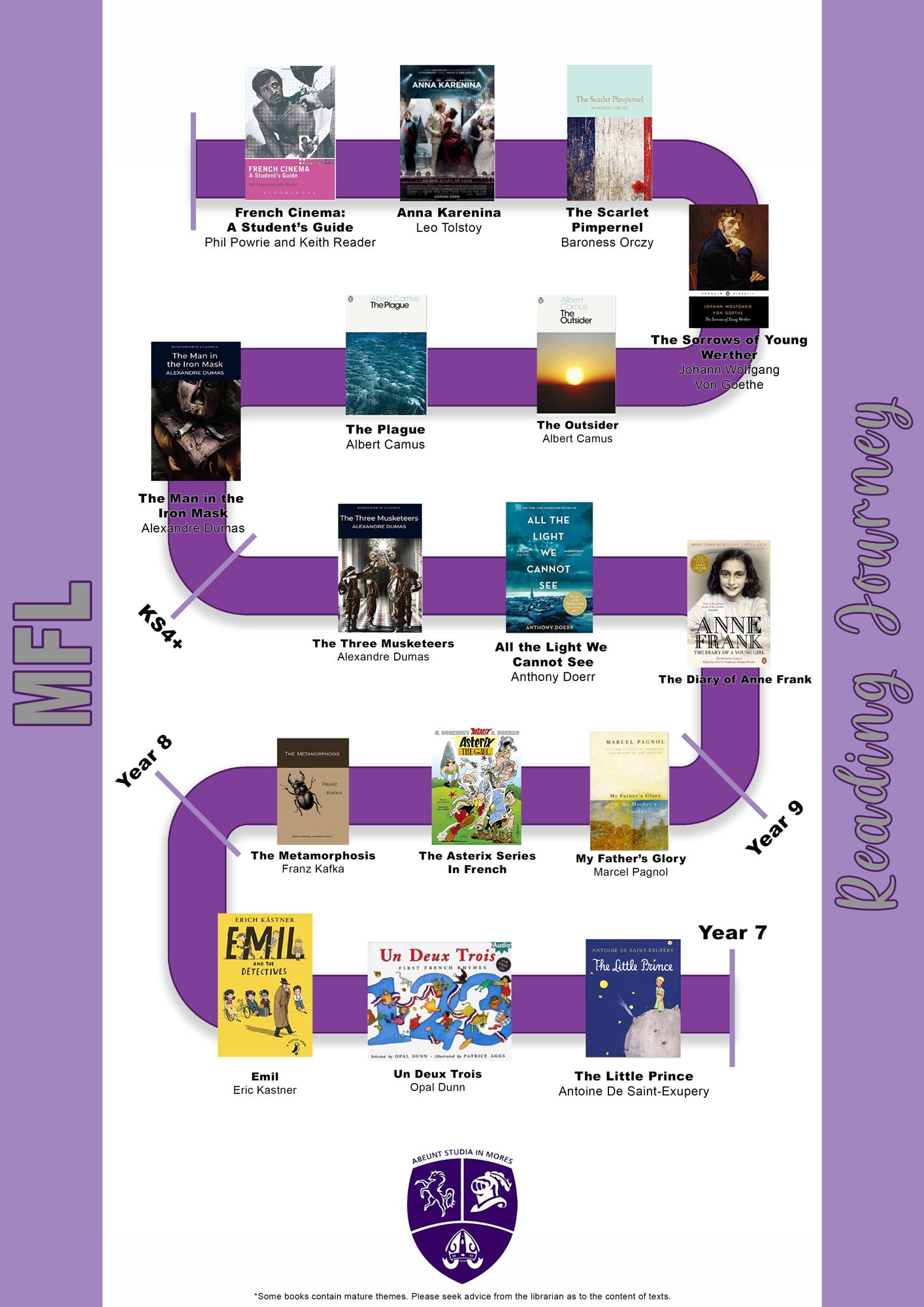- Home
- Academic Excellence
- Subject Information
- German
German

Curriculum Vision
The German Department aims to create the very best linguists by sharing a love of learning German that extends outside of the classroom and equips them with the skills and confidence to consider themselves as ‘World Citizens’.
Our department is committed to developing strong, lifelong linguistic skills to thrive and succeed in language learning and beyond; encouraging and inspiring students with quality teaching and broadening their awareness of German speaking countries and traditions.
As communication is at the heart of everything we do, we equip our students with the desire and confidence to communicate in German yet encourage them to use their language skills to take risks.
Curriculum Learning Journey
The students’ initial language learning focusses on them and their immediate life experience, e.g. family, free time and school. Throughout KS3, students are then exposed to more advanced aspects of their teenage lives such as media, healthy lifestyle, ambitions etc.
In KS4, students revisit topics from KS3 in more depth, add more complex subject matter, whilst using and understanding more advanced grammar. Exam strategies are a natural progression from skills already gained at KS3.
In KS5, the course content moves on to cover numerous aspects of the German speaking world including historical, political and literary aspects.
Our department aims to equip our students for life after school by providing a high-quality language education which fosters their curiosity and deepens their understanding of the world.
We encourage them to step beyond familiar cultural boundaries and to develop new ways of seeing the world beyond the classroom.
Curriculum Reading Journey

Summary of Study at each Key Stage
Key Stage 3
In KS3, students start learning German, receptively and productively, in order to be able to talk about themselves, their interests and beyond and to express and to justify opinions. They then progress to using the language to communicate in the real world for practical purposes.
The content covered in our curriculum underpins and enables the application of skills. As a department, we carefully plan progression through our curriculum with regular revisiting of content and skills to build on existing knowledge. From the outset, we teach grammar, phonics and vocabulary; using the correct terminology and making explicit links to English and other foreign languages’ grammatical structures, pronunciation and cognates.
Key Stage 4
Further rationale behind our curriculum design includes the revisiting and building on existing knowledge. The topic areas and grammatical structures which are introduced at KS3 are seen as building blocks for more in-depth learning at KS4. The study of German at GCSE expands to include topics linked to the wider world such as work and the environment.
We implement our curriculum through using a variety of teaching approaches and tasks which encompass the exam skills of listening, speaking, reading and writing and translation. We expand the Cultural Capital of our students by embedding their linguistic acquisition within a wide range of knowledge which goes beyond their own cultural experience and sets them up as intercultural citizens. We do this by teaching language contextually within topic areas and using target language to model and encourage students to communicate in the foreign language.
Key Stage 5
At A level, the course addresses a range of social issues and trends, as well as aspects of the political and artistic culture of German speaking countries. The KS5 curriculum includes the study of a film (Die Welle) and a work of literature (Der Besuch der alten Dame). Students are also required to complete an independent research presentation on a topic of their choice linked to the German speaking world.
Students are taught strategies needed to become an effective and advanced language learner consisting of: listening and reading comprehension; translation to and from the Target Language; written response to works; discussion on a theme; independent research presentation and discussion.
Opportunities Beyond the Classroom
Key Stage 3
- German clinic
- Peer mentoring with our A level students
- Freiburg trip-Germany
Key Stage 4
- GCSE exam intervention to stretch our most able students
- GCSE German Clinic
- Film club
- Freiburg trip-Germany
Key Stage 5
- Targeted exam skills sessions
- Peer mentoring to support younger students
- Film club
- Berlin trip-Germany. This is a cross-curricular trip with the History department.
Assessment
For all Key Stages the following applies:
The marking of pupils’ work is a vital part of teaching and is also seen as such by the pupils themselves. Marking, above all, should be positive and encouraging, identifying what the student can do using praise and suggesting areas for development. Work will be marked in a rota of self, peer and teacher. Students mark and reflect on their work in purple; peer marking is in red; teachers mark in green. Formal assessments take place at the end of each Module. Different marking strategies will be used for different pieces of work and not all assignments need to be marked in the same depth.
Additional Reading and Website Recommendations
Key Stage 3
- Own textbook for use in year 7,8 and 9
- Class sets and digital copies of workbooks
- Access to www.duolingo.com for independent study and learning.
- Access to www.languagenut.com for homework and learning.
- Digital versions of textbooks on www.memrise.com
Key Stage 4
- Stimmt GCSE German textbook
- Bespoke workbook produced in house
- Digital version of the GCSE textbook available on www.memrise.com to enable pupils to work on various language skills on a digital device
- Pupil access to www.duolingo.com to improve general German language skills.
- Access to www.languagenut.com for homework and learning.
Key Stage 5
- A Level German textbook
- Bespoke workbooks to supplement the textbook.
- Der Besuch der alten Dame + bespoke workbook.
- Die Welle film + bespoke in house workbook
- Digital version of workbooks on www.memrise.com
- Digital version of A Level textbook on www.memrise.com
- Various other resources as recommended by German teacher.
Revision Strategies and Materials
Key Stage 3
= Online digital vocab exercises based on the Stimmt textbook.
www.languagenut.com = Online vocab and exam practice for Key Stage 3 and 4.
www.goethe.de/ins/gb/en/sta/lon.html = Key Stage 3 materials from the Goethe Institute.
www.leo.org = Online dictionary for learners of German.
Key Stage 4
Edexcel exam board website
www.memrise.com = Online digital vocab exercises based on the Stimmt textbook.
www.languagenut.com = Online vocab and exam practice for Key Stage 3 and 4.
http://www.bbc.co.uk/education = BBC Bitesize = Online exam practice for Key Stage 4 German
www.goethe.de/ins/gb/en/sta/lon.html = Key Stage 4 materials from the Goethe Institute.
www.leo.org = Online dictionary for learners of German.
Key Stage 5
Edexcel exam board website
www.memrise.com = Online digital vocab exercises based on the Edexcel A level textbook.
Deutsche Welle
https://www.newsinslowgerman.com/ = Slowly spoken German news
https://www.youtube.com/channel/UCbxb2fqe9oNgglAoYqsYOtQ/featured
www.goethe.de/ins/gb/en/sta/lon.html = Key Stage 5 materials from the Goethe Institute.
www.leo.org = Online dictionary for learners of German.
www.dynamic-learning.co.uk = Online exercises and texts linked to the A Level Textbook.
www.tagesschau.de = Online news channel.
www.ardmediathek.de = Online German language television.
Subject Specific Equipment Requirements
We expect all our students to be organised when they come to the lessons. As well as a normal equipment, they should, as per school policy, have a red pen for peer marking and a purple pen for self-marking.
Key Stage 3
At KS3, we strongly encourage them to purchase a bi-lingual dictionary.
Key Stage 4
At KS4, we recommend the purchase a bi-lingual dictionary for vocabulary acquisition as well as the ’Stimmt! Edexcel GCSE German Grammar and Translation Workbook’.
Key Stage 5
At KS5, students can use in lessons the online dictionary www.leo.org and we would like our students to purchase their own A level textbook.
Ways in which parents can support students
Key Stage 3
- Encourage to watch TV shows and the news in the target Language with subtitles
- Listen to music in the target language
- Get films, books, magazines from online resources
- Get engaged with interactive games such as Blooklet, Kahoot and Language nut
- Ask your child to teach you an aspect of the foreign language (grammar, vocabulary, structures)
- Have a penfriend
- Work Independently on list of Websites provided by the Department
Key Stage 4
- Monitor students’ daily vocabulary learning.
- Ensure students are making and using suitable revision resources.
Key Stage 5
- Ensure that the student is doing as much independent study as possible.
- Encourage the student to spend as much time as possible following current events on German language media.